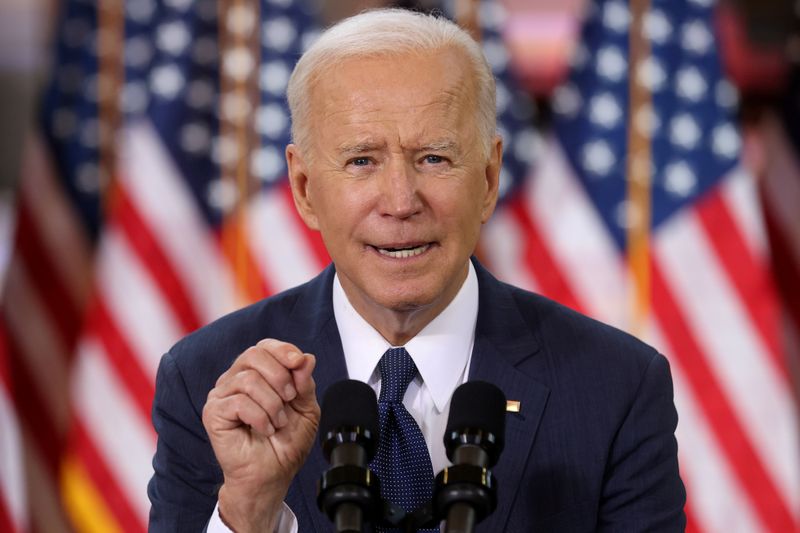By David Shepardson and Heather Timmons
WASHINGTON (Reuters) - U.S. President Joe Biden's sweeping $2.3 trillion plan to rebuild America's crumbling infrastructure proposes doubling federal funding for mass transit and spending $80 billion to expand and modernize passenger rail service.
Public transit systems have suffered through the COVID-19 pandemic as tens of millions of Americans worked from home and curbed business and tourism travel. Many avoided subways and buses due to health concerns over traveling in confined spaces.
But even with widespread vaccinations, it is unclear if demand will return any time soon. Work-from-home arrangements initially seen as temporary pandemic measures now appear to be a long-lasting phenomenon for millions of U.S. workers.
In several cities with the largest, often most decrepit public transit systems, residents have literally headed for the hills to places beyond mass transport networks. Lower-income workers reliant on public transportation are at risk of being at a permanent disadvantage if investment lags in those systems.
In 2019, Americans took 9.92 billion trips on buses and rail systems. It is a figure that fell 53% to 4.64 billion trips in 2020, according to the American Public Transportation Association. Fourth-quarter demand fell 62% in 2020 from the previous year, while in Washington, D.C., transit fell 86% in the same period.
By comparison, annual U.S. private vehicle travel fell only 13.2% in 2020.
Taxpayers often are subsidizing near-empty buses and trains to keep essential transit routes open. Congress has awarded transit agencies nearly $70 billion in emergency assistance, including $30.5 billion Biden signed into law in March.
Some Republicans in Congress in February sought to shift $10 billion of the transit assistance to states to repair highways, but Democrats rejected that.
On Monday, Senator Ed Markey and Representative Ayanna Pressley, both progressive Democrats, introduced legislation to help transit systems offer free or heavily discounted travel. They cite data that low-income families typically spend nearly 30% of household income on transportation expenses.
Even before the pandemic triggered the first economic shutdowns in March 2020, many U.S. mass transit systems were plagued by overcrowding and delays after years of under-investment.
Biden's plan would invest $85 billion in subways, buses and other transportation systems, the plan says, "to modernize existing transit and help agencies expand their systems to meet rider demand," part of a broader push to get more people out of private cars.
"It will ultimately reduce traffic congestion for everyone," the plan says.
Representative Chuy García, a Democrat representing Chicago, said the funds to modernize transit will ensure families "are not cut off from jobs, healthcare, or school simply because they can't afford a car."
Last year, a growing number of Americans opted to buy lower-priced used cars, and automakers reported a higher number of first-time new car buyers.
Volkswagen (DE:VOWG_p) Group of America Chief Executive Scott Keogh said in November the number of first-time U.S. car buyers had grown during the pandemic. "It’s clearly a signal that people have some doubts in public transportation, potentially some doubts in ride-share,” Keogh said.

Mary Nichols, who was California Air Resources Board chair, said last year COVID-19 had led "to an increase in sales of old cars for people who might have taken a bus before.”